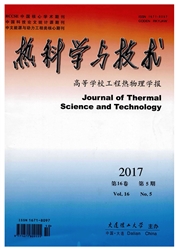

 中文摘要:
中文摘要:
针对Sandia实验室关于正庚烷喷雾的实验数据,基于CONVERGE软件采用大涡模拟方法对以正庚烷为燃料喷入超临界环境中的雾化过程进行了数值模拟。以实际气体状态方程Soave-Redlich-Kwong(SRK)和Peng-Robinson(PR)两个方程为基础,重点研究了两状态方程对超临界状态下燃料喷雾的发展过程、射流密度变化、燃料喷雾的质量分数随温度变化的影响,并用模拟所得与实验结果进行对比。结果表明,同一时间下PR方程模拟的燃料喷雾的贯穿度更大;两实际气体状态方程下射流表面都有大的密度梯度,并与实验所得的密度值相吻合;PR方程对超临界工况的计算更优于SRK方程。燃料质量分数随温度的变化符合实际的情况,密度值的急剧变化验证了射流表面是一个介于液体与超临界流体之间的混合层,并可以通过密度梯度来推测混合层位置。
 英文摘要:
英文摘要:
Large eddy simulations of injection and atomization of n-heptane under supercritical conditions were performed using commercial CFD software CONVERGE.The predictions were compared to experimental data provided by Sandia National Laboratories.Based on two cubic equations of state,i,e,SRK and PR equations,the effect of equations of state on dynamics of fuel spray,fuel jet density,the variation of mass fraction of fuel spray with temperature was studied and compared with experimental data.The simulated results show that the fuel spray penetration predicted by the SRK equation is deeper,and there exits a significant density gradient on the jet flow interface for both equations.The predictions agree well with the experimental results,but the PR equation behaves better than the SRK equation under supercritical conditions.The variation of mass fraction of fuel spray with temperature is well predicted.The sharp change in density verifies that the jet flow interface is a mixing layer between the liquid and its surrounding supercritical fluid.The density gradient can be used to identify the mixed layer position.
 同期刊论文项目
同期刊论文项目
 同项目期刊论文
同项目期刊论文
 On the Discrepancy in the Reaction Rate Descriptions of Turbulent Premixed Combustion in Porous Medi
On the Discrepancy in the Reaction Rate Descriptions of Turbulent Premixed Combustion in Porous Medi Numerical investigation on the thermal non-equilibrium in low-velocity reacting flow within porous m
Numerical investigation on the thermal non-equilibrium in low-velocity reacting flow within porous m Development of a new skeletal mechanism for n-decane oxidation under engine-relevant conditions base
Development of a new skeletal mechanism for n-decane oxidation under engine-relevant conditions base 期刊信息
期刊信息
